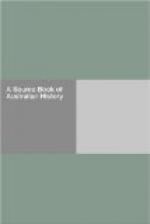The Mayor addressed the Meeting as follows:—“Gentlemen, I have called you together again for the purpose of declaring on whom the late election has fallen, but previously to doing so I will read two protests, one of which has been sent to a deputy returning officer, and the other to myself.” His worship then read the protests, which are as follows:—“I, the undersigned burgher of Bourke Ward, do hereby protest against the Returning Officer receiving any votes for the Right Hon. Earl Grey, on the following grounds:—
“First, that Earl Grey as a Peer of the British Parliament cannot hold a seat in a Colonial House of Legislative Representation.
“Second, That he cannot move Her Majesty in two distinct Legislatures.
“Third, That he is not qualified according to the Act.
“Fourth, That he is an absentee, and there is no one present to represent him—to state that he will sit if elected.
(Signed) “Sidney Stephen, Barrister-at-law.”
The Mayor remarked that these protests were very respectably signed, and were deserving of attention, but although they were signed by numerous lawyers he believed he was relieved of all difficulty on the subject by being guided by the 96th clause of the Constitutional Act which rendered it imperative that all complaints of this nature must be addressed in the form of a petition to the Governor and must be addressed by one of the candidates, or one-tenth of the whole of the electors. Several other authorities were then referred to by His Worship, who expressed himself thoroughly satisfied as to the course he ought to pursue, and announced the following as the final state of the Poll in the Respective Wards.
WARDS GREY
FOSTER
Gipps Ward . . 50 . . 17
La Trobe Ward . . 102 . . 15
Bourke Ward . . 43 . . 32
Lonsdale Ward . . 100 . . 28
___ ___
295 92
leaving a majority for Earl Grey of 203, who was declared amidst enthusiastic cheering, to be duly elected as a member of the Legislative Council for the Electoral District of the City of Melbourne.
GOLD
+Source.+—A Lady’s Visit to the Gold Diggings of Australia in 1852-53 (Mrs. Charles Clacy), pp. 19-29, 82-85
Gold was discovered in Australia at a time when the people of every nation in Europe were demanding a greater share in their respective governments. Many who immigrated in search of gold took a leading part in making the Australian Governments democratic.
Melbourne, 1852.—The non-arrival of the Mail-steamer left us now no other care save the all-important one of procuring food and shelter. Scouts were accordingly despatched to the best hotels; they returned with long faces—“full.” The second-rate, and in fact every respectable inn and boarding or lodging-house were tried, but with




